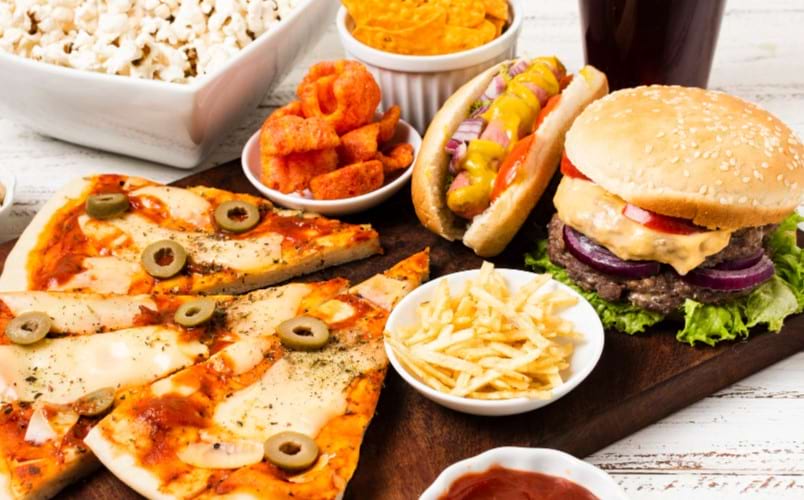Pregnancy cravings can hit so bad, and it’s hard for pregnant mothers to resist junk food during this time. Constantly consuming junk food during your pregnancy can have various health issues such as unhealthy weight gain, fetal development issues, and increased risk for premature delivery. It can affect your unborn baby in various ways like an increased risk of allergies, acrylamide exposure, and mental health risk, to name a few.
Research including 23,000 mothers who were part of the Norwegian Mother and Child Cohort shows that those who ate junk foods during pregnancy have children with increased behavioral problems such as aggression and tantrums.
No special diet is required during pregnancy, but eating balanced and healthy meals ensures you and your baby get enough nutrients.
A healthy diet is required to keep up with the changes and developments, which will also help with delivery and recovery once your baby is out in the world.
What are the harmful effects of eating junk food during pregnancy?

Unhealthy weight gain
For 9 months, your weight is a significant indicator of your baby’s development.
In fact, during the monthly visit to your doctor, it is one of the first things they check on you.
It is because you are supposed to gain weight, considering that your growing baby is slowly developing in your womb, but that doesn’t mean you can go ahead and over-eat.
Eating in moderation is always the key. You also need to eat nutritious foods as much as possible for your and your baby’s health.
Fetal development
The food that you eat affects how your baby grows and how they are developing in your tummy.
Do you know that a lack of protein during pregnancy interferes with the proper kidney development in the fetus?
They will continue to grow and develop, of course, but it might cause a massive development of high blood pressure and renal disease in the babies as they reach adulthood.
Increased risk for premature delivery
The low fiber in your diet might cause extra pressure on bowel movement, which may lead to the rupture of your water bag triggering labor and delivery.
We don’t want that; we want to make sure that the delivery of our little one goes as smoothly as possible but premature delivery will expose them to many risks and complications.
How could junk foods affect your baby?

1. Poor food preferences
According to a study published in Frontiers in Endocrinology based on animal behaviors, what the mother eats during pregnancy could affect her baby’s food preferences.
Therefore if your diet consists of fatty foods and low-nutrient foods, the chances of your child picking up these likings are high.
That could not be good for a growing child who needs as many nutrients as possible; building habits are also an important part of their growth.
2. Increased risk for allergies
A high-sugar diet during pregnancy could lead to asthma or allergies for your baby.
A study published in the European Respiratory Journal shows that a mother eating a high amount of sugar in the form of sucrose, high fructose corn syrup, fruit juices, or honey during pregnancy had an increased risk of allergy and asthma between the ages of 7 and 9.
3. Acrylamide exposure
Acrylamide is formed when food rich in starch, like potatoes and bread, is baked or cooked at a very high temperature.
Therefore, it could be present in food like potato chips and fries.
According to research, it is believed that it could restrict the baby’s growth; acrylamide is also thought of as carcinogenic.
4. Mental health risk
Some scientific evidence shows that consuming unhealthy foods and drinks during pregnancy could increase the risk of your child having mental health issues later on.
As adults, we understand how difficult it is even for us to have mental health problems.
I think I speak for most moms when I say that we try to do our best to shield them from the potential causes that might trigger mental health issues in our children.
5. Fetal macrosomia
It is when the baby weighs more than 8 pounds, 13 ounces (4,000 grams), regardless of their gestational age.
This could cause difficulty during labor and increase the chances of medical interventions such as cesarean section.
FAQs
What trimester is most important to eat healthily?
In the third trimester, a baby’s nutritional needs reach their peak during this time of rapid growth.
This trimester still calls for higher levels of iron and protein; they are crucial to maintaining increased blood volume, your baby’s growth and cellular development, and a healthy placenta.
When is a fetus fully developed?
Thirty-one weeks into your pregnancy, or 29 weeks after conception, your baby has finished most of its significant development.
Conclusion
Giving in to pregnancy cravings is normal; eating junk food once or twice will not harm your baby’s growth in your belly.
But eating more healthy foods and drinks could compensate for that.
Drink lots of water, give in to sugar and salt here and there but don’t forget to eat your fruits and vegetables too.
Holding off your cravings for unhealthy foods during pregnancy will benefit you and your baby in the long run.


